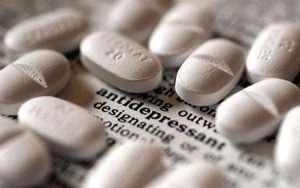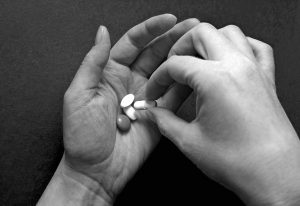What people refer to as the blues is usually depression. Depression, or the blues, is an unpleasant emotional state characterized by what therapists refer to as “the negative cognitive triad.” That’s 1) negative thoughts about oneself, which are the voices of your inner critic harping on you for what you supposedly have done wrong, should have done differently, and on and on 2) negative thoughts about others that lead you to see what you don’t like in them instead of heeding their virtues and enjoying them, creating relationship problems and 3) negative thoughts about the future.
Some people describe the blues, and also depression, as feeling like there’s a dark cloud over you. Others refer to depression as seeing the world through dark glasses. Feelings of hopelessness and helplessness are another indicator.
How can you get rid of your blues and your inner critic by treating the underlying depression?
There are four main strategies:
- Change your feelings.Take pills or use one of the newer treatment methods that change your bluesy mood by changing your inner body chemistry and brain functioning.
- Change your thoughts. Eliminating the inner critic may get rid of the depressed, bluesy feelings.
- Change your actions. Get exercise. Go out and be with people. Express more gratitude. Do acts of kindness.
- Identify and address the problem that initially triggered your depressed feelings and thoughts. Find a new solution and both the negative feelings and the negative thoughts will evaporate.
Why do people take antidepressant medications?
There are four main reasons why people who may be distressed by something in their lives end up defining their depression as an illness and taking medication.
First and foremost, depression is a terrible feeling that sufferers sorely want to get rid of.
Second, most folks have not been fully informed of the medications’ downsides. I’ll elaborate on drug dependency below. In addition, these medications can cause serious weight gain, a significant drop in libido (ability to enjoy sex), hazy thinking, and a general emotional numbness that blocks feelings of joy in addition to feelings of depression.
Third, people who take the medications may not have been informed of their relatively low rate of effectiveness. They can be effective if they work, but they only work for something like about 60% of people who use them.
Fourth, most people who take anti-depressant medications have not been informed by their doctor about alternative treatment options. To a man with a hammer, the world is a nail. Physicians know about illness and prescribe medications. As psychologist Martin Seligman has explained, depression is a relatively normal, if quite unpleasant and often self-defeating, response of giving up in response to a challenging life circumstance.
What are the downsides of assuming that depression is an illness and therefore needs pills?
As mentioned above, two particularly negative side effects of medication that doctors do not sufficiently explain include potential weight gain and decreases inability to experience sexual arousal. Doctors may mention them but often do not clarify that both extra pounds and decreased interest in sex can have strongly negative impacts on personal self-esteem, on attracting a mate and on sustaining a marriage.
The other significant risk that doctors may or not fully explain is that users may have a hard time getting off these medications. When a drug company says that their anti-depressant medication is not addictive, strictly speaking, they are telling the truth. A strict clinical definition of an addictive substance or activity is one that induces both dependency and craving. Antidepressants do not induce craving. Over time they do, however, make users drug dependent.
Craving is a familiar feeling to anyone who has fallen in love. The intense sexual desire that drives someone in love to find every way possible to be near the object of their desire is a craving. Someone who craves alcohol similarly may wake up in the morning already urgently wanting a drink.
What does “drug dependent” mean? Drug dependency is the state a body goes into when it has adapted to the presence of a chemical to the point that the body requires steady doses of the substance to maintain normal functioning. We are all, for instance, chemically dependent on water.
Our society is highway-dependent. Many of us have become accustomed to having highways that enable us to drive to work from the suburbs. Having bought a house in the suburbs on the assumption that we can take the highway to work, we have become highway dependent. It’s unlikely that anyone has a craving for highways. Many of us though have become highway dependent.
If you for some time have been taking an antidepressant medication, the odds are that your body has become drug dependent. That means that if you should decide today that as of tomorrow you will no longer take the medication, starting tomorrow, you are likely to discover that without the pills that you normally take your body will plunge into a serious depressive state.
Does this depression mean that you need after all to stay on your meds because the pills are all that have stood between you and the depths of despair? Not at all. To the contrary, this depression means that your body has become dependent on the antidepressant pills. Is this addiction? No, but it is drug dependency.
I am not saying that no one should ever take antidepressant medication. They do help some people. Some people experience relatively few to zero negative side effects. My point is just that if you are considering taking these medications, or have for some time been using them, you deserve accurate information about the factors to take into account in your decision, including information about other treatment options.
Here are six vital points to consider.
1) There now are multiple excellent alternatives to medication for working your way out of depression, including various kinds of talk therapies such as CBT, energy therapies such as Bradley Nelson’s Emotion Code and Body Code, acupuncture, exercise, electrical stimulation of the brain, the visualization you can download for free from my website, or read about how to do on one of my other blogposts, couples therapy, and more.
2) Depression is induced by a situation in which you have experienced insufficient power. If you close your eyes and picture whom or what you may feel angry at, you will see an image of the trigger person or situation. Fix that situation, and your depression will be likely to go away.
3) If your doctor is recommending medication as a short-term fix, use the pills until you feel better. Use your renewed energy to address the power-loss situation. Then begin the medication-weaning process asap.
4) Wean slowly. Consult your prescribing doctor for an appropriate weaning schedule for the particular medication that you are taking.
5) Be aware that research has shown that the most powerful way to overcome depression and keep it far from you, in the long run, is the combination of therapy and medication. Medication alone and psychotherapy alone have very similar effectiveness rates, but medication has an impact more quickly, and psychotherapy tends to have more longer-lasting impacts.
6) There is a visualization exercise that you can do with a therapist, a friend, or on your own that may help you conquer the depression in just a few minutes. See my posting on A New Treatment for Depression.
6) In my clinical experience, I find that most depression is a response to relationship problems. Look into marriage education, couples counseling, or a combination of both to upgrade your relationship. These treatment routes can make you a double winner. You can both end the depression and simultaneously gain a vastly more gratifying marriage or romantic partnership.
Susan Heitler, Ph.D., a Denver Clinical psychologist, is an author of multiple publications including From Conflict to Resolution for therapists, The Power of Two and poweroftwomarriage.com for couples who want to strengthen their relationship. Dr. Heitler’s most recent book is Prescriptions Without Pills, with a free companion website at prescriptionswithoutpills.com.











